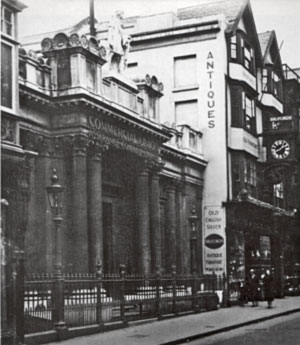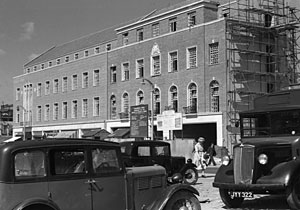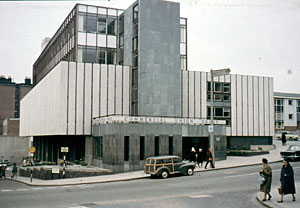
West Of England Fire and Life Insurance Company
Page updated 15 May 2009
Return to Exeter's services
 One of the most
prominent commercial buildings in the High Street during the
nineteenth-century and first half of the twentieth-century was the
grand, stuccoed and railed headquarters of the West of England Fire and
Life Insurance Company. From humble beginnings, the company has evolved
into Aviva, one of the largest insurance companies in the world.
One of the most
prominent commercial buildings in the High Street during the
nineteenth-century and first half of the twentieth-century was the
grand, stuccoed and railed headquarters of the West of England Fire and
Life Insurance Company. From humble beginnings, the company has evolved
into Aviva, one of the largest insurance companies in the world.
Fiery beginnings
On the 22 May 1807 a fire broke out in the small town of Chudleigh, about 10 miles to the south-west of the city. It had been a very dry spring with weeks without any rain. A small fire broke out in a pile of furze in a bakers shop, and the dry conditions caused the flames to spread explosively into the roof. Burning thatch was blown by the wind, spreading the fire from property to property. Before the day was out, 166 houses were destroyed, leaving only the church and seven dwellings from destruction.
Samuel Francis Milford was troubled by the devastation caused by the fire, and he convened a meeting, on the 1 October 1807, at the Old London Hotel, Sidwell Street, to form an insurance company that would provide cover for property owners against fire. The name was to be the Devon & Cornwall Insurance Company, but a few days later it was changed to the West of England Fire Insurance Company.
Initially only providing fire insurance, in February 1808 the company quickly expanded operations into the rest of the United Kingdom, and in the August of the same year, they offered life insurance for the first time. Within a few years they were insuring "buildings, furniture, merchandise, farming stock, shipping and other property." By September 1808, the company had £600,000 of capital according to a statement in the Flying Post following a Board Meeting, along with a list of agents. The company occupied premises on the corner of North Street and High Street, on the site now occupied by Athena between 1809 and 1821.
The West of England established a fire brigade in March 1816 when they resolved to supply the inhabitants of any town that exceeded £500 of premiums per annum a fire engine of the "largest and best construction, gratis, if desired.." In 1821 they moved into 240-242 High Street, the site of their iconic headquarters.
The destruction of Kingdon and Sons foundry by fire in October 1826 was covered by the company."...and the flames bursting upward the whole of this vast building, three storeys high with an attic, extended 150 feet in length, became one immense body of fire, which, the wind being high, was vomited forth with a bellowing that strongly reminded those present of the descriptive accounts of volcanic eruptions;"
The insurance payment was £1,500, a not inconsiderable amount in those days. It was Kingdon and Son who supplied, in 1840, the iron railing that was placed along the front of 240-242 High Street. Growth followed and by 1850 the company was the sixth largest insurance company in the country.
A murdered employee
One employee of the West of England, Nathaniel Bennet was the victim of an infamous murder in 1841. He spent an evening at Brewer's Cattle Market Inn, a beer house with reputation as a brothel, where he is said to have visited two of the establishments ladies and to have drunk a good amount of ale. He walked back to Colleton Terrace where he lived, followed by two men, William Pitts and John Brinsmead, who approached him and demanded money. The next morning his bruised and drowned body was found in the river close to Trews Weir. Pitts and Brinsmead were arrested and charged with his murder. Brinsmead testified against his accomplice for a lesser sentence, and Pitts was found guilty of manslaughter and sentenced to 15 years transportation.
Fire brigades
Whenever there was a fire in the city, engines and men from the three major insurance companies would turn out to quench the flames. One such fire in September 1871 at Alphington, saw the West of England Number 2, the Norwich the Sun and one other attend. With the fire raging through the Church House and Admiral Vernon Inn, the brigades had trouble fighting the flames due to a lack of water. Two of the appliances were used to bring water from a local brook, hampering the fire fighters and leaving the buildings gutted, with only the walls protruding from the ground.
Despite the valiant efforts of the fire brigades from the West of England and the other insurance companies, it was apparent that such a system of fire fighting was inefficient. The loss of 187 lives at the Theatre Royal fire of September 1887 was the turning point for the West of England Fire and Life Insurance Company, which closed its brigade's to concentrate on insurance. The Exeter insurance companies gave their equipment to the city council and the West of England's 'Little West' fire pump was retired. Superintendent Pett was appointed as the first chief fire officer to form a city fire brigade based in the old West of England fire station in New North Road.
Commercial Union
In March 1894, the West of England shareholders agreed for the Commercial Union Assurance Company to take over the company and 240-242 High Street would become a regional office. The premises in the High Street were destroyed by enemy action on the 4th May 1942, although the tough old façade with the statue of King Alfred, had to be demolished.
Commercial Union opened an office in newly constructed premises at 242 High Street in the 1950's, but they also acquired Concorde House in South Street in the 1960's. Concorde House is credited with installing the first commercial computer in the city that was known as 'Cutie' (Commercial Union Totally Integrated Electronics). It was installed at a cost of £300,000 in 1962. The machine had 10 tape handling machines, 3 paper tape readers, the main computer and an illuminated console. It had a clock speed of 1 mega-cycles which performed 7,000 instructions a second. By today's standards, it was a snail. There was a viewing gallery so visitors could wonder at this miracle of electronics, with university students and even darts teams gawping at the staff who felt like exhibits in a zoo. Commerciaal Union's computer systems were consolidated into a centre in Whyteleafe, Surrey during 1970, and the computer room at Concorde House was closed.
Eventually, Commercial Union occupied a new building in Barnfield Road, opposite Barnfield Crescent, where 'Little West' the fire engine last used at the Theatre Royal fire in 1887 was on display in the foyer. Norwich Union which is part of the Aviva Group has an office at Pynes Hill, and is the only link with the old West of England Fire and Life Insurance Company to remain in the city..
 The West of England Fire and Life
Insurance building at 240-242 High Street before the war. The iron
railing was supplied by Kingdon and Son.
The West of England Fire and Life
Insurance building at 240-242 High Street before the war. The iron
railing was supplied by Kingdon and Son.
 The almost completed Commercial
Union House in the early 1950s, replaced the old building. Photo
by Maurice Swansbourough
The almost completed Commercial
Union House in the early 1950s, replaced the old building. Photo
by Maurice Swansbourough Concorde House in South
Street. Courtesy
of Alan H Mazonowicz
Concorde House in South
Street. Courtesy
of Alan H Mazonowicz
 The computer room containing CUTIE. Courtesy
of Alan H Mazonowicz
The computer room containing CUTIE. Courtesy
of Alan H Mazonowicz
│ Top of Page │